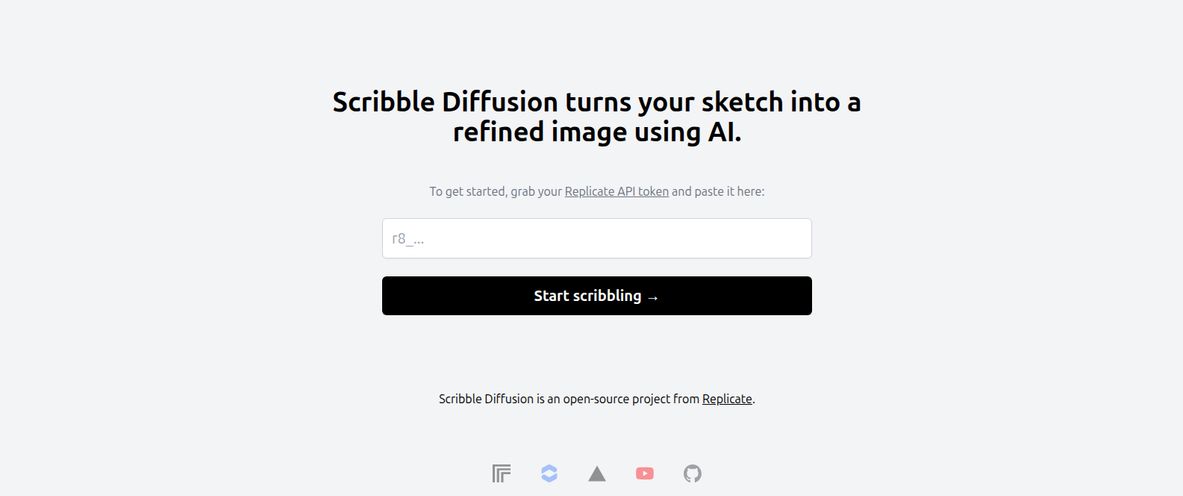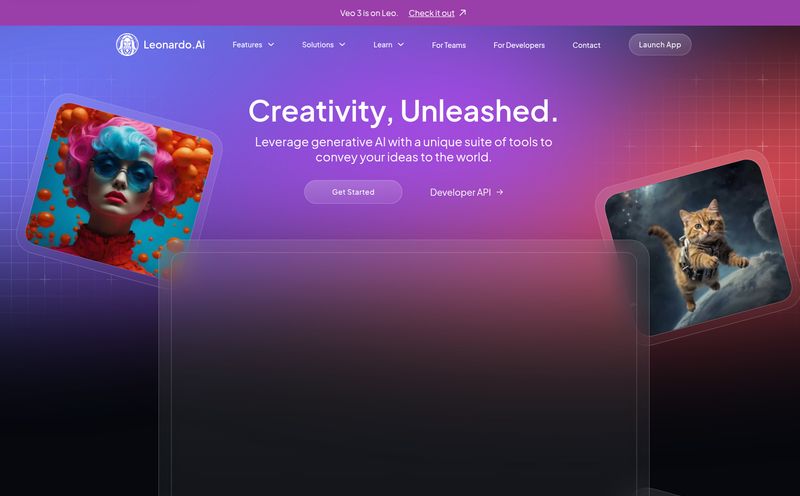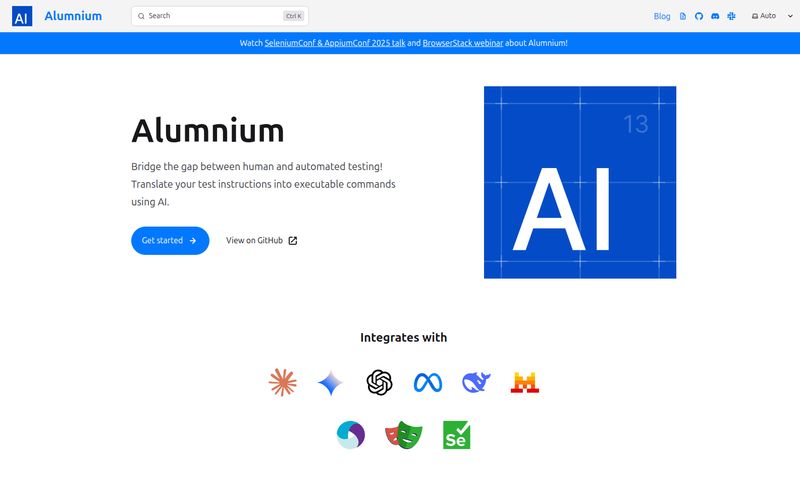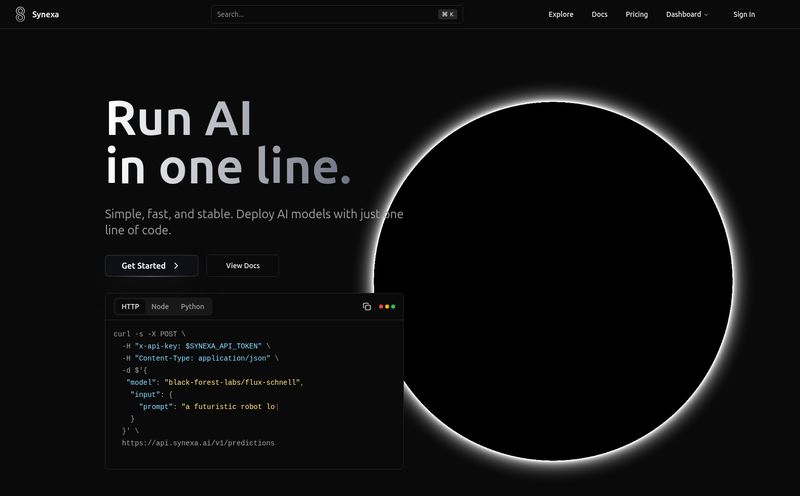The generative AI boom has been a bit of a Wild West situation. One minute we’re all marveling at what ChatGPT can do, the next we’re having hushed, slightly panicked conversations in the breakroom about whether it’s safe to paste that sensitive client email into the prompt box. We’ve all felt that pull—the desire to use this incredible tech to be more efficient, paired with the ice-cold fear of a data leak.
For months, I've been on the lookout for a tool that gets it. A platform that doesn't force businesses to choose between innovation and security. I've seen a few contenders, but recently, a platform called Omnifact has been popping up on my radar. It’s making some big claims, especially about being a “privacy-first generative AI platform built for the workplace.”
Big words. But can it back them up? I decided to take a closer look.
So, What Exactly is Omnifact?
At its core, Omnifact is a secure AI platform designed for businesses. Think of it as a secure, walled-off playground where your team can use generative AI without your data being hoovered up to train some future global model. It’s built from the ground up with things like GDPR and data sovereignty in mind. For my fellow European marketers and business owners, you know how much of a headache that can be. This isn't just an afterthought; it's their entire foundation.
The platform offers a familiar AI chat interface, but the magic happens behind the scenes and in a standout feature they call 'Spaces'. But more on that in a minute.
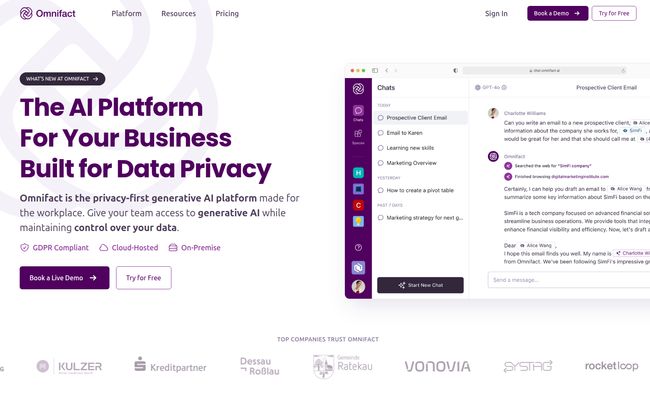
Visit Omnifact
Finally, An AI That Respects The Data Privacy Elephant in the Room
The single biggest hurdle for AI adoption in any serious business is data privacy. Period. Samsung had that infamous incident with employees leaking source code via ChatGPT. It’s the kind of cautionary tale that keeps CTOs up at night. Omnifact tackles this head-on. Their whole pitch is centered on keeping your data, well, yours.
How? They offer two deployment models: a secure Cloud-Hosted option and an On-Premise installation. That On-Premise option is a game-changer for industries with super-strict data handling requirements like finance or healthcare. It means the AI runs entirely within your own infrastructure. No data ever leaves your building. That’s not just peace of mind; for some businesses, its the only way they can even consider using this kind of tech.
More Than Just a GDPR Checkbox
Here’s something that really caught my eye. Omnifact isn’t tied to one AI provider. You can choose which large language model (LLM) you want to use. The platform supports models from OpenAI, Anthropic, Google, and even open-source players like Mistral. I love this.
Why is it a big deal? It’s about not putting all your eggs in one basket. What if one provider's performance dips, or their pricing skyrockets? What if a new, more efficient model comes out tomorrow? With Omnifact, you have the flexibility to switch. It’s like having a car where you can swap out the engine depending on whether you need speed, fuel efficiency, or towing power. It future-proofs your AI strategy.
Beyond a Simple Chatbot: Let's Talk 'Spaces'
Okay, this is the feature that I think really sets Omnifact apart. They call it Spaces. You can think of a Space as a custom-trained AI assistant. You feed it your own internal documents—think product specs, support wikis, marketing strategy docs, HR policies, you name it—and it becomes an expert on that specific topic.
Imagine creating a 'Marketing Space' fed with all your past campaign data and brand guidelines. Your team could then ask it things like, “What was the CTR for our Q3 email campaign last year?” or “Draft a social media post in our brand voice announcing our new product.” It’s like having an intern who has instantly read and memorized every document you've ever created. The testimonials I saw seemed to back this up, with users calling it “indispensable.”
This is where the real value lies for businesses. It moves beyond generic AI answers to highly specific, context-aware insights based on your own proprietary information. And because it's all happening within Omnifact's secure environment, you don't have to worry about that proprietary info leaking out.
The All-Important Question: Omnifact Pricing
Alright, let's talk money. No one likes surprises here. Omnifact has a tiered structure that seems pretty standard for a B2B SaaS tool. I've broken it down simply:
- Starter Plan (Free): This is your basic trial mode. You get limited access, enough to poke around and see how the interface feels. It's great for an individual who wants to kick the tires, but you'll hit the feature wall pretty fast.
- Pro Plan (€25 per user/month): This is the main offering for teams and most small to medium-sized businesses. It unlocks the good stuff: more AI model options, the Omnifact Assistant, web browsing, image generation, and all the core features. The price is billed annually, so keep that in mind.
- Enterprise Plan (On Request): The classic “call us for a price” tier. This is for the big guns. It includes everything in Pro plus the really high-end features like on-premise hosting, single sign-on (SSO), unlimited 'Spaces', and dedicated support. That opaque pricing always gives me a slight twitch, but it’s standard practice when dealing with custom implementations.
Honestly, the Pro plan seems pretty reasonably priced for what it offers, especially when you factor in the cost of a potential data breach.
The Good, The Bad, and The AI
No tool is perfect, right? After digging in, here's my honest breakdown. On the plus side, the focus on privacy is a massive win. The flexibility of choosing your LLM and the option for on-premise deployment are huge differentiators. And that 'Spaces' feature... I'm a big fan. It's genuinely useful.
On the flip side, the free plan is quite limited. It’s more of a demo than a truly functional free tier for a team. And while the Pro plan is solid, some of the most powerful features, like full-blown on-premise hosting and SSO, are locked away in the custom Enterprise plan, which could be a barrier for some mid-sized companies. Also, email support times can vary, with Pro getting 24-hour support and Enterprise getting a dedicated team, which is something to be aware of.
So, Is Omnifact The Right AI Tool For Your Business?
In my experience, the answer to this question is almost always, “it depends.”
If you're a freelancer or a solo creator who just needs a powerful writing assistant, a standard ChatGPT Plus or Claude Pro subscription is probably fine. You’re likely not handling troves of sensitive corporate data.
However, if you're part of a business—especially in Europe—and you've been hesitant to adopt generative AI because of security and GDPR concerns, then Omnifact should absolutely be on your shortlist. If you want to build a centralized, secure knowledge base that your team can intelligently query, the 'Spaces' feature alone could be worth the price of admission.
It's a serious tool for serious businesses that want to balance the power of AI with the responsibility of protecting their data.
Frequently Asked Questions About Omnifact
- Is Omnifact GDPR compliant?
- Yes, absolutely. GDPR compliance and data sovereignty are central to Omnifact's design. They offer hosting options and data handling procedures specifically to meet these requirements.
- Can I use my own data with Omnifact?
- Yes, that's the primary purpose of the 'Spaces' feature. You can upload your internal documents, knowledge bases, and other data sources to create custom AI assistants that are experts on your business.
- Do I have to use OpenAI's models?
- Nope! Omnifact is vendor-independent, meaning you can choose from various leading LLMs, including those from Anthropic (Claude), Google, and Mistral, giving you more control and flexibility.
- What is on-premise deployment?
- On-premise deployment means the entire Omnifact platform can be installed and run on your company's own servers. This provides maximum security and control, as no data ever needs to be sent to an external cloud service. This option is available on the Enterprise plan.
- Is there a free trial for Omnifact?
- Omnifact offers a free 'Starter' plan which works like a limited trial. It allows you to test the basic functionality of the platform before committing to a paid plan.
- Who is Omnifact best for?
- It's best for small to large businesses, especially those in regulated industries or in Europe, that prioritize data privacy and want to create custom AI solutions based on their own internal data.
My Final Thoughts
The AI tool market is getting crowded, fast. It’s easy to get lost in the noise. But Omnifact seems to have found a clear, important lane for itself. Instead of just chasing the biggest model or the most features, they've focused on solving the single biggest problem holding businesses back: trust. By building a platform around privacy, security, and flexibility, they’ve created something that feels less like a gadget and more like a genuine enterprise solution. It's a promising step in the right direction for the responsible use of AI in the workplace.
